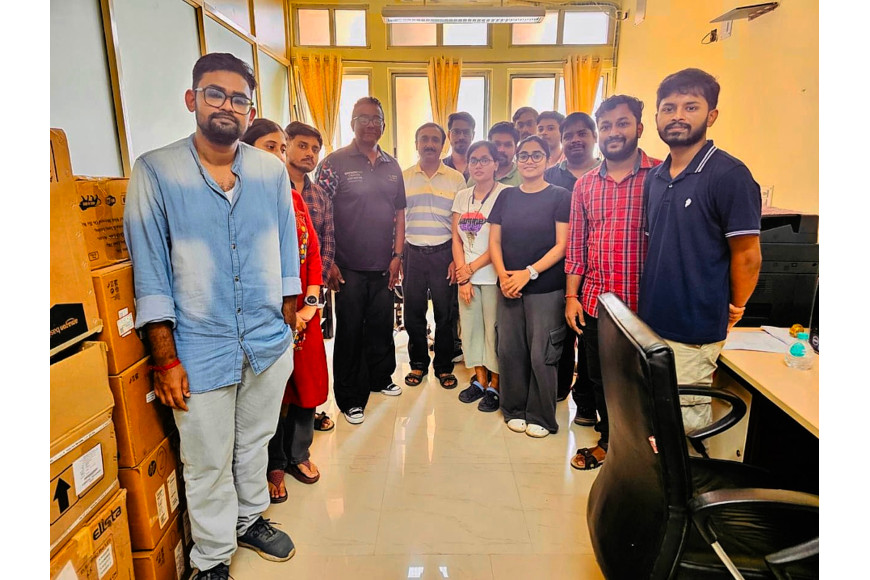Professor Megandhren Govender, a top ranked C2 National Research Foundation (NRF)-rated Astrophysicist and researcher at the Durban University of Technology (DUT) is extremely passionate of his role of teaching of mathematics and research, both locally and internationally.
Prof Govender, who is from the Faculty of Applied Sciences dedicates himself to his number-crunching craft, having received numerous accolades for his research. He has published over 130 research papers which are related to relativistic astrophysics in some of the top ranked journals in mathematical physics including Monthly Notices of the Royal Astronomical Society, Physics Letters B, Journal of Cosmology and Astroparticle Physics, Physical Review D, Classical and Quantum Gravity, European Physical Journal C, to name just a few.
Prof Govender highlighted the key role that research plays in developing graduates and postgraduate students who are in a position to utilise their knowledge to address both local and global problems.
“My work involves mathematical modeling of dynamical processes which incorporates differential equations, graphical analyses and testing models for stability. The techniques used in stellar modeling can be adopted in investigating climate change, pollution, food production, diseases, evolution of viruses to name a few,” he conveyed.
Providing a brief overview of his research background at DUT, he relayed that his research focusses on gravitational phenomena within the framework of Einstein’s theory of general relativity and modified gravity theories. “Specifically, I investigate the final fate of stars much larger than our Sun as they lose equilibrium and collapse under their own gravity while radiating energy. More recently, my research has been centred on modelling compact objects such as neutron stars involved in binary mergers which are sources for gravitational waves. We also work on understanding the role played by pressure anisotropy and variations in density profiles in determining the complexity of stellar objects,” he said.
The talented Astrophysicist was recently invited by several universities and colleges in India to present talks on his current research on stellar structure and evolution.
Prof Govender shared that the lecture series focus he had presented was three-fold which entailed highlighting the research done in mathematical physics at DUT to the international community. Establishing new research collaborations, as well as establishing an exchange programme involving seasoned academics between DUT, research institutions, universities and colleges in India. His lecture series also included a science show at the Malda College.
Giving feedback on his trip, Prof Govender indicated that it fared very well in India. “The lectures were extremely well received and the responses from students, emerging and established researchers were amazing. I have already been invited to various other universities and colleges across India and will be visiting early next year,” he shared ecstatically.
Speaking on the calibre of students he had encountered on his trip to India, Prof Govender expressed that the postgraduate students were amazing. “These students are working on cutting-edge research problems including black holes, gravitational waves, quantum aspects of cosmology, the incorporation of AI in stellar modelling, amongst others. They publish in high-impact factor journals. PhD students are given five years to complete and submit their theses. I met a student who published 23 first-class research papers for his PhD which is mind-blowing,” he expressed.
Prof Govender explained that mathematics is a universal language so the talks were well understood and resulted in many interesting discussions, leading to exciting new research ideas.
“One of the highlights on his trip was a presentation of a science show to some 800 school learners at Malda College. The learners responded brilliantly to the experiments. They were enthusiastic and understood the importance of mathematics and the sciences. I was also very pleased to meet some grade 10 learners who created their own APPS using AI, “ he explained enthusedly. Prof Govender elaborated that there has been great interest shown in collaborative teaching and research amongst the universities and colleges that he had visited. “We are looking to invite mathematicians and physicists from these institutes to participate in some online teaching at DUT and the same would apply to DUT staff who want to teach students across India,” he emphasised.
Prof Govender indicated that it was vital for such research visits, especially abroad.
“I think it is fundamentally important to pursue research in one’s field of interest. Afterall, why would one pursue a PhD? Research visits, attending conferences and workshops allows one to keep up with current trends in one’s area of interest. It allows for ideas to be shared and new concepts and thoughts to come into fruition. Presenting to graduate and postgraduate students, emerging researchers and seasoned academics helps build confidence and is an excellent measure of one’s knowledge and command of the subject area,” he enthused.
For Prof Govender, his takebacks from this trip in terms of his teaching and learning is that the use of technology and demonstrations in the teaching of mathematics and physics is important to generate excitement and interest amongst students thereby enhancing learning.
“I am pleased with my current teaching style and philosophy. This was evident in terms of the response from the participants at the talks. I personally would not want to be in class where the lecturer is just mumbling along and trying to solve for ‘x’ or teaching some concept in differential Calculus without connecting it to some phenomenon or application,” he confessed.
Prof Govender conveyed his thanks and gratitude to everyone who supported him on this research visit including Professor Darren Lortan, Head of Mathematics, Professor Suren Singh, Executive Dean, Applied Sciences, DVC:RIE, Professor Fulufhelo Nemavhola and the Finance Office at DUT and the various universities and colleges in India. “Many thanks to my family as being away from home for long periods is never easy,” he said.
On the mathematical and science horizon, Prof Govender is currently working on several projects with his collaborators, some of which include the gravitational arrow of time, the role of temperature in the evolution of complexity in radiating stars, Ghost stars and investigating mass-radius relations for binary mergers from the observation of gravitational waves.
Pictured: Professor Megandhren Govender with students in India.
Waheeda Peters

